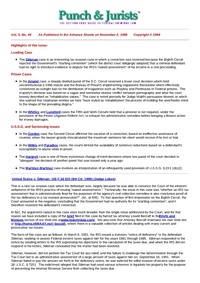United States v. Wilke, 156 F.3d 749 (7th Cir. 1998) (Judge Kanne)
United States v. Paradies, 14 F.Supp.2d 1315 (N.D.Ga. 1998) (Judge Alaimo)
Both of these cases deal with a growing problem for prison officials: what to do with prisoners who are unusually susceptible to prison abuse. Wilke case …
Court held that permitting a defendant to appeal from a downward departure simply because the district court fails to state the reasons therefore, would impermissibly erode the jurisdictional limitation contained in 18 USC § 3742(a)(3).
Last year in the July 21, 1997 issue of Punch and Jurists, we …
Case reversed decision by Judge Sporkin which held that legislation and prison regulations that effectively prohibited distribution of publications such as Playboy and Penthouse were facially invalid under the First Amendment.
This case deals with a challenge brought by a group of prisoners and publishers challenging the constitutionality …
Judge Reinhardt argued that the defendant's three uncounted prior frauds (involving between $2000 and $28,000) were not "serious enough" to warrant the departure granted - and he objected to the majority's ruling that the upward departure was "justified purely on the basis of the Defendant's likelihood of recidivism" - …
The Court also held that the provisions of the AEDPA making aliens with certain criminal backgrounds ineligible to apply for waivers of deportation did not apply retroactively.
In a strong decision, Judge Green concluded that neither the AEPDA nor the Illegal Immigration Reform and Immigrant Responsibility Act of …
The Court noted that ""Special parole" had been an additional penalty for all drug offenses that was mandatory in all cases until the Sentencing Reform Act replaced it with "supervised release." Special parole was imposed by the district judge to follow the period of imprisonment;when it is revoked, the …
Quotation from Judge Weld's dissenting opinion in which she strongly disagreed that the majority had shown any reasonable relationship between pornography and rehabilitation that would justify regulations banning publications like Playboy in prisons.
QUOTE OF THE WEEK - Making darn sure that prisons are punishment - not playgrounds.
…
United States v. Wilke, 156 F.3d 749 (7th Cir. 1998) (Judge Kanne)
United States v. Paradies, 14 F.Supp.2d 1315 (N.D.Ga. 1998) (Judge Alaimo)
Both of these cases deal with a growing problem for prison officials: what to do with prisoners who are unusually susceptible to prison abuse. Wilke case …
Whitley v. Hunt, 158 F.3d 882 (5th Cir. 1998) (Judge DeMoss)
Lunsford v. Jumao, 155 F.3d 1178 (9th Cir. 1998) (Per Curiam)
In these decisions, the Fifth and Ninth Circuits held that a prisoner, seeking to bring a Bivens-action against federal officials (see, Bivens v. Six Unknown Named Agents, …
Case held that Federal prisoners pressing monetary claims in a Bivens action against Federal officials need not exhaust unavailable administrative remedies - although it also confirmed that Federal prisoners must exhaust any available remedies.
Whitley v. Hunt, 158 F.3d 882 (5th Cir. 1998) (Judge DeMoss)
Lunsford v. Jumao, …
This is a rare tax evasion case which the defendant won, largely because he was able to convince the Court of the inherent unfairness of the IRS's practice of issuing "naked assessments." Technically, the issue in this case was "whether an IRS tax assessment that is administratively final for …
In this case the Court analyzed the meaning of the phrase "about to complete" all acts necessary for the commission of a crime under USSG § 2X1.1(b)(2), and held that the district court had improperly denied a three point reduction.
The sole (and somewhat esoteric) issue raised on …
The Court reasoned that even though the BOP has eliminated the regulation's reliance on the meaning of "crime of violence" in Section 924(c), the BOP "has no choice but to define 'nonviolent offense' under 18 U.S.C. 3621(e)(2)(B) by reference to what might constitute a crime of violence." In support …
United States v. Wilke, 156 F.3d 749 (7th Cir. 1998) (Judge Kanne)
United States v. Paradies, 14 F.Supp.2d 1315 (N.D.Ga. 1998) (Judge Alaimo)
Both of these cases deal with a growing problem for prison officials: what to do with prisoners who are unusually susceptible to prison abuse. Wilke case …
Here the Court held that the district court erred by using the Guidelines applicable to CCE offenses (which resulted in 33 years) rather than Guideline applicable to drug offenses near a school (which called for a life sentence).
The Court noted that the counts for distribution of cocaine …
The Court held that: "A unilateral transfer by the Bureau of Prisons does not involve the prisoner's fault and an interruption thereon is not mandated by statute. Such a transfer is more analogous to the inadvertent prisoner release cases. Surely if a prisoner can be credited with time spent …
Here the defendant objected to the use of 20 year old convictions in the determination of his status as an armed career criminal - an argument which the court promptly rejected, stating that there was no temporal limit in the statute and that the court lacked the authority to …
The court noted that because administrative searches "require no warrant or particularized suspicion, an administrative search scheme invests the Government with the power to intrude into the privacy of ordinary citizens. This power carries with it a vast potential for abuse. . . . Therefore, courts must take care …
Here the Court rejected a motion for a new trial based on alibi evidence which the court found not credible and was raised 9 years after the event that the defendant was working at home with friends at the time of the alleged crime.
Case held that defendant was denied effective assistance of counsel by his attorney, who substantially underestimated defendant's potential sentence, thereby inducing him to go to trial rather than accept plea bargain.
This case raises a question that we have often asked: Do the Guidelines really "create a clear, …
